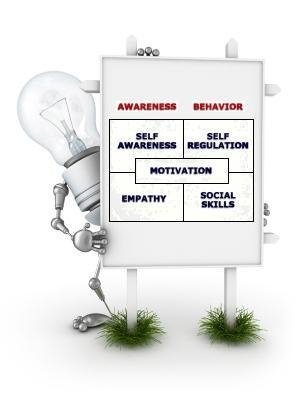- Home
- Emotional Intelligence
Emotional Intelligence Theory
Emotional Intelligence Theory (EI) is a behavioural model first developed in the 1970’s by psychologists Howard Gardner, Peter Salovey and John 'Jack' Mayer, it rose to prominence in 1995 by Daniel Goleman’s book Emotional Intelligence. Since then it has become a widely recognised model for understanding how we control our emotions, how we can understand the emotions of others and therefore how we can better manage the relationships we have with others.

In this section we will explain the emotional intelligence theory, why you should learn about it and what its relevance is in the context of coaching and personal development. We will also provide tips on developing your own emotional intelligence through a wide range of courses.
1. What Is Emotional Intelligence
2. Why We Should Understand Emotional Intelligence Theory
3. Emotional Intelligence Theory And Its Relationship With Coaching
4. How To Assess Emotional Intelligence
5. Emotional Intelligence Courses For Your Personal Development
What Is Emotional Intelligence?
In searching for an answer to the question “ What is emotional intelligence? ” you will come across a wide range of different answers and emotional intelligence definitions.
According to John D. Mayer and Peter Salovey, two of the leading researchers in this area, one emotional intelligence definition is “the ability to monitor one’s own and others’ feelings and emotions, to discriminate among them and to use this information to guide one’s thinking and actions.”
Daniel Goleman in his 1995 book Emotional Intelligence: Why It Can Matter More Than IQ stated that ‘There is intelligence in the emotions (and) intelligence can be brought to emotions’
Many ways of describing emotional intelligence include words such as, authentic, empathic, empowering, expansive, resilient, etc. Using these can cause confusion especially if the true meanings of these words are not clearly understood by those people you are trying to explain emotional intelligence too.
Interest in emotional intelligence has grown significantly since the 1990s, with research suggesting that good emotional understanding can lead to improved effectiveness and better interactions when working with people. It is mainly for this reason that you will discover that emotional intelligence is being recognized as a fundamental component of coaching.
You may find many people will struggle to identify with the term “Emotional Intelligence” itself, especially if the phrase is new to them. What is intelligent about being emotional?? In helping people to understand what it all means, it is worth taking an emotionally intelligence approach - have concerns about other people and think about how your answer is going to affect them.
In the absence of any clearly agreed answer to the question “ What is Emotional Intelligence? ” the best answers , for me, come from a time long before anyone had come up with the expression Emotional Intelligence. “Do unto others as you would have others do unto you” comes from the Bible (Matthew 7:12) and Aristotle is reputed as saying “Anybody can become angry - that is easy, but to be angry with the right person and to the right degree and at the right time and for the right purpose, and in the right way - that is not within everybody’s power and is not easy.”
In a 2004 article, Mayer and
his colleagues presented some observations on the characteristics of
emotionally intelligent people. They found that these people are:
- better at perceiving, using, understanding, and managing their emotions and those of other people
- generally more agreeable and open
- less likely to engage in risky behaviors, such as smoking, drinking, taking drugs, and violence
- able to enjoy more positive social experiences
So in summary to answer the question what is emotional intelligence? - It is all about a set of skills that define how effectively people perceive, understand, reason with and manage their own and others’ feelings. Within coaching these skills become vitally important as emotions are an inherent part of coaching activities at all levels.
Why Should We Know About Emotional Intelligence Theory?
As we discovered above, emotional intelligence describes a person’s capacity to understand and control their own emotions, and to recognize and manage those of others.
We all know some people who are able to engage with others immediately making them feel special. They may not be aware that they are using their emotional intelligence well.
It has been shown that emotional intelligence is more important than intellect (IQ) and this can be improved well into later life with supportive coaching.
As coaches, you will know that a good understanding of the person that you are coaching helps to build up that special, trusting relationship that works well. Understanding your own emotional intelligence will help those that you are coaching to understand their emotional intelligence. You can do this by looking at how you manage your feelings and emotions between you and how you use this knowledge to manage your relationship. This is the reason why we should know about emotional intelligence
With those that you are coaching, you need to make it clear that their feelings are no different from those of other people and that what happens to them will happen to everyone. What they experience with their emotions and their feelings has an impact on their actions and behavior. It is how they manage their reactions and behavior where the difference lies. This is where your coaching can made a real difference. However, you need to be continually aware that your own feelings and emotions will have an affect how you coach.
There is intelligence in the emotions (and) intelligence can be brought to emotions. Daniel Goleman (1996)
The Emotional Intelligence Theory
Coaching awareness
The first component of emotional intelligence theory is awareness – how well do you know yourself and how aware you are of others? Along with self-awareness, one of the more important emotional intelligence competences that has been identified is empathy – that is, how good you are at sensing others’ emotions, understanding their perspective and taking an active interest in their concerns.
Self awareness and empathy are good starting points to enable you and your coachee to focus on areas of improvement. You will need to consider whether it is more effective to coach someone on their weaknesses, as is traditional, or to look at the emotional intelligence competence where they are already strong and make it even better.
Underpinning all of emotional intelligence theory is motivation – the underlying drive to succeed. Does your coachee really want to make any necessary changes? Without this, any coaching intervention that you employ is not going to work. Through good coaching, you can build up motivation by focusing on goal-setting activities that helps to concentrate on strengths rather than weaknesses. Focusing on negatives creates anxieties and so you will inhibit the self-directed learning that makes changes.

Coaching Behavior
Action through behavior forms the second component of emotional intelligence theory. How do you control the way that you use your feelings and emotions? How good is your self regulation and how does this impact on the thoughts, feelings and actions of others?
Through coaching, you can give direct observable feedback on how people show their behavior through their body language, voice and tone. You can give further input around perceptions. That is the way beliefs, values and upbringing can affect perceptions of people and situations, by filtering and distorting the picture of reality. This is a good precursor to the development of empathy and thus social skills.
A really useful activity is to ask the coachee to list everyone in their network and then mark against each the ones who will help them to change and the ones who may hinder their attempts. This will help you to look at that what they are experiencing through the actions and the behaviors of other people and to further explore understanding around perceptions. It will also help you to determine how their motivation is affected by other’s actions and behaviour in more detail.
So, you can see that you can really help develop your coaching using emotional intelligence. However, you will need to allow your coachee plenty of time to reflect on their personal learning and to constantly practice in order to bed in these new effective emotionally intelligent habits.
How To Assess Emotional Intelligence
EI assessments can be very confusing as there are a number of different ways to measure emotional intelligence with no real consensus from research, from the academics and from the experts. This is partially due to the fact that there is no consistent model of emotional intelligence.
At the present time there are three ways that you can assess emotional intelligence.
- Ability based assessments.
These are based on the idea that emotions are useful sources of information that help to make sense of ourselves and our interactions with other people. Our ability to work with emotions depends upon our ability to recognise the emotion in faces, pictures, voices, pieces of art, etc. These types of assessments are very difficult to measure accurately because ability is so individual in the way that we perceive, understand, use and manage our emotions and the emotions of others. - Trait based assessments.
These are based on a series of questions looking at our behavioral nature and our self perception of our emotional abilities. The answers given are compared to the answers those of a sample of people (called the norm group) and these can be consider to assess our personality traits within a personality framework. These types of assessment can be easily faked. - Mixed assessments.
Emotional intelligence is a mixture of competencies and skills that drive our performance that can be linked to personality. A mix of both ability and trait based assessments is probably a more appropriate way to look at EI assessment. However, there is some debate about their reliability.
Emotional competencies are not inborn talents, but are learned capabilities that can be worked on and developed to achieve outstanding performance. This is where coaching is helpful.
Working as a coach you can look at assessing emotional intelligence as part of the coaching process. The best approach is to find an emotional intelligence assessment that you are comfortable with using; one that you understand in terms of its application and its limitations and one that you know well.
Remember – your role is to coach not to act solely as an assessor and so your EI assessment should be used to identify, and agree, which areas to coach.
A specific assessment is, therefore, not as important as being able to use your chosen assessment efficiently and effectively. This must be done with the full agreement and understanding of the person that you are coaching in order to raise their self awareness.
The emotional intelligence assessment can be used to measure the success of you and your coaching by getting the person you are coaching to complete an assessment before you start coaching and then again after a few months of your coaching interventions. Changes in EI ability or subtle changes in personality traits, or a mix of both, will show up in the assessment to demonstrate how effective your coaching has been.
Emotional Intelligence Courses
All the emotional intelligence courses below have been created by internationally recognised emotional intelligence coach Robin Hills. Director of Ei4Change, Robin possesses British Psychological Society Test User Occupational Ability (Level A) and Occupational Personality (Level B) certificates in psychometric testing. He is qualified to use trait-based assessments (NEO and Trait Emotional Intelligence Questionnaire), type-based assessments (Myers Briggs Type Indicator Practitioner (Step I and II)) and behavioural-based assessments (Advanced DISC). He uses all these with pragmatic business-focused applications, specifically linking together the outputs from assessments to give real practical relevance to improve effectiveness and productivity.
All courses are priced in US Dollars (USD) and converted to your local currency when you purchase so these courses are available to used worldwide. All courses are in published in the English language.
Note - The final course is an introductory bundle with significant savings over the purchase of individual courses.
Course 1 - An Introduction To Emotional Intelligence
This course will help you understand emotional intelligence and how to combine thinking with feelings
in order to build quality
relationships and to make good authentic decisions.
The course helps you to
- Understand emotional intelligence and weight up the advantages and disadvantages
- Unwrap ways to improve emotional intelligence
- Explore working with emotional intelligence and the basic do's and dont's
- Build effective relationships and make better decisions by using emotional intelligence.
Use the blue button below to get more details, see the introductory video and make use of the free trial.
Course 2 - Developing Emotional Intelligence Through Self Awareness
The course helps you to
- Understand how you perceive yourself in order to develop better self-awareness of who you are and your relationship to others
- Explore what, when, why, and how different emotions impact your actions and thoughts
- Uncover your inner resilience to pursue personally relevant and meaningful goals
In summary, how to develop the perception that you have of yourself by tapping into your feelings of inner strength and confidence. Click more info for the free trial and introductory video.
Course 3 - Developing Emotional Intelligence Through Emotional Expression
Are you aware of the power of your expression and the reactions from other people?
This emotional intelligence course helps you to
- Understand how remain self-directed and openly express thoughts and feelings through use of your internal perception
- Discover how to become more assertive and emotionally independent
- Learn how to communicate your feelings in constructive and socially acceptable ways
Course 4 - Using Emotional Intelligence To Develop your Interpersonal Skills
Our relationships with other people are displayed in many different ways, some are transient whilst others can be more deep and meaningful.
This course helps you to
- Develop relationships founded on compassion and trust
- Explore empathy and showing respect for the views of other people
- Discover your ethical boundaries and you work within these and those of the groups and organisations within which you work
Put simply, this emotional intelligence course helps you to act responsibly whilst still demonstrating concern for others.
Course 5 - Decision Making With Emotional Intelligence
The course helps you to
- Understand the way that people make decisions using emotional information to solve problems
- Discover how to get a better understanding of reality
- Explore ways to resist or delay impulses and remain objective to avoid rash behaviours
In summary, how to develop more rational, thoughtful responses underpinned with good emotional awareness.
Course 6 - Stress Management with Emotional Intelligence
Understand more about emotions and managing stress to develop your emotional resilience.
The course helps you to
- Understand how to cope
with the emotions associated with uncertainty and change
- Discover how to better manage stress through realistic optimism
- Explore ways to adapt and become more flexibible
Complete Emotional Intelligence Course Bundle
This course bundles together all of the six previous emotional intelligence courses and saves you money.
This introductory bundle costs $98 and offers excellent value for money.
It includes educational training videos, training notes, and training worksheets, based around the popular and widely-used EQ-i 2.0 (Emotional Quotient Inventory) model available through Multi Health Systems Inc.
The bundle covers the main components of emotional intelligence. Feel more confident, have better control, build deeper relationships, make better decisions and experience less stress.
Further Reading
The Emotional Intelligence Pocketbook (The Pocketbook) by Margaret Chapman (Paperback - 20 Oct 2001)
The New Leaders: Transforming the Art of Leadership into the Science of Results by Daniel Goleman, Richard E. Boyatzis, and Annie McKee (Paperback - 6 Jun 2002)
Working with Emotional Intelligence by Daniel Goleman (Hardcover - 24 Sep 1998)
See Also:-
Working With Emotions To Drive Business Performance
Book Reviews:-
The Emotional Intelligence Pocketbook (The Pocketbook)
The New Leaders: Transforming the Art of Leadership into the Science of Results
Working with Emotional Intelligence
The Brain And Emotional Intelligence: New Insights
Notes
This section of emotional intelligence articles has been written by Robin Hills, one of our team of coaches and trainers who has vast knowledge and experience this field as well as a passion for helping others develop their own understanding.






